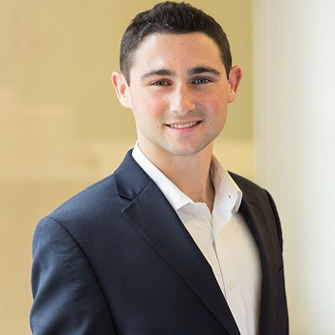Economic Justice Fellow
 Background
Background
Class of 2022
Hometown: Scarborough, ME
Undergrad: University of Pennsylvania
Majors/Minors: Urban Studies
What did you do prior to coming to the University of Maine School of Law?
I spent three years in Washington, DC, where I worked on federal housing, healthcare, and community development issues both from within the federal government and for a nonprofit policy organization.
Maine Law
Why did you choose to attend the University of Maine School of Law?
I was looking for a school that would offer not only a strong transactional law curriculum but also meaningful opportunities to apply my education by engaging in local policy and community development efforts. Through mutual contacts in Washington, DC, I was introduced to Maine Law’s former Dean and Professor Peter Pitegoff, who told me about the new Economic Justice Fellowship that the school was getting ready to launch. It was the perfect match for my interests.
What has been most helpful to you in making the adjustment to the life of a Maine Law student?
Amazing guidance and mentorship from the school’s professors, administration, and staff.
How would you describe your experience at Maine Law?
The work is challenging but in a positive way. The people are down to earth and interesting. The size of the school is ideal.
What is one thing that has surprised you about Maine Law?
I have been repeatedly surprised about the levels of flexibility and support offered to students interested in creating new paths both during law school and into their legal careers.
What are you hoping to do after graduation, and how is Maine Law helping you to facilitate that goal?
I’d like to try a bunch of different things, but I’m always drawn to industries and organizations that are mission driven and that are heavily engaged in both policy and practice. Maine Law’s curriculum, Career Services Office, and professional network – particularly related to my experience as an Economic Justice Fellow – have all presented so many opportunities to find interesting work.
Last summer, the fellowship funded my internship with Avesta Housing, a Portland-based nonprofit housing developer, and the Maine Affordable Housing Coalition (MAHC). As part of my work, I spent the summer traveling to courthouses across Maine building the state’s first eviction tracking database, which was used to inform the state’s eviction prevention efforts throughout the COVID-19 pandemic. Throughout my 2L year, I continued working with MAHC helping to draft and advocate for recently-passed legislation that substantially increased funding for tenant legal representation in eviction court. At the same time, I completed an Independent Study where I wrote a paper on the flawed legal justifications behind aspects of landlord-tenant law and eviction court procedure.
Activities
Are you involved in extracurricular activities, either on or off campus? What are they?
During my 1L year, I volunteered with the Portland Mentoring Alliance, where I worked with a Portland High School student helping him to prepare for his driver’s license test and explore post-high school soccer opportunities. I also served on the City of Portland’s Community Development Task Force, advising City Council on how to best allocate their federal community development block grant funds. I am now one of the co-leaders of the Maine Law Soccer Club.
When you are not at school, how do you like to spend your time?
Playing soccer, skiing, seeing friends and family, and hopping around Portland. Tennis has been my new COVID-era obsession.
Portland
What do you like best about Portland?
You can spend a whole day downtown without ever needing to get in a car. When you do want to leave, the beaches, mountains, lakes, and airport are all a quick and easy distance.
Advice
For someone who is considering attending Maine Law, how would you describe the student community here?
There’s a lot of diversity in terms of age, interests, and goals of the student body. Everyone works hard in pursuit of something much bigger than a grade or degree. It makes for an engaging and supportive community.
If you could tell a prospective student one thing about Maine Law, what would it be?
If you come here with an idea of things you’d like to learn and experiences you’d like to try, the school will find a way to make it possible for you.
